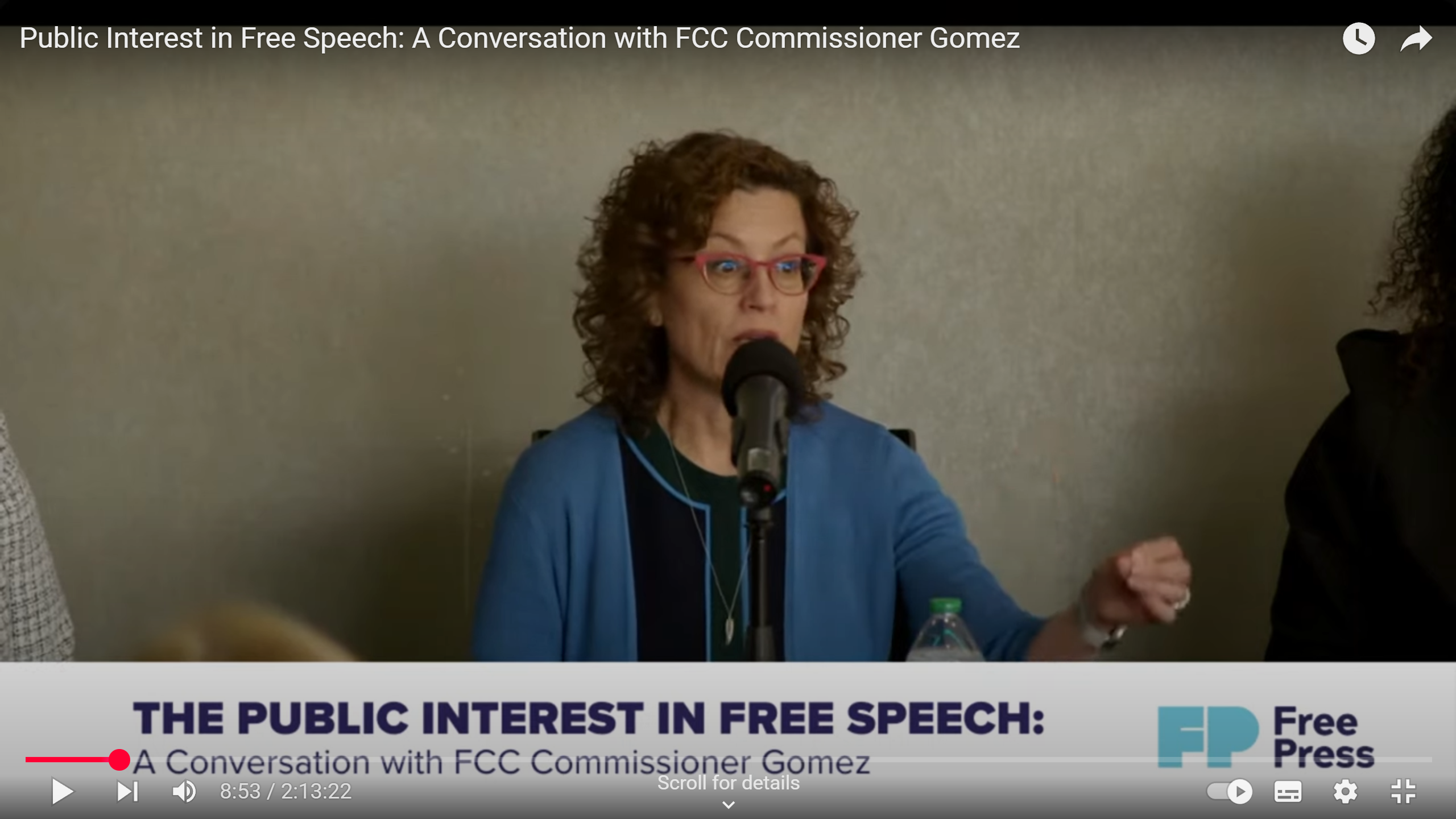Gomez Says FCC Lacks Authority to Regulate Fact-Checking, Content Moderation
Democratic commissioner argues that the regulatory effort is part of a broader push to ‘censor,’ ‘control’ the news

LOS ANGELES—During the first stop of her First Amendment Tour outside of Washington, FCC commissioner Anna Gomez spoke out against attempts by the agency and Trump administration to chill dissent, complaining that FCC chair Brendan Carr has been working in a variety of ways to harass and bully news outlets that don’t toe the administration’s views.
Speaking at a forum hosted by Free Press here, Gomez also detailed arguments that the FCC lacks the authority to regulate content moderation and fact-checking efforts by social media companies, broadcasters and news outlets.
In remarks to the cable news outlet Newsmax last December, Carr said that he planned to have the regulator crack down on fact-checking efforts as part of a larger effort “to smash” the “censorship cartel.”
“I think Americans have been seeing an unprecedented surge in censorship, particularly over the last couple of years,” Carr argued.
“As you said yourself, diversity of opinion is so important in this country, and it's gonna be one of my top priorities, is trying to smash this censorship cartel,” Carr added.
Since then Facebook and others have cut back on their content moderation efforts.
“I launched this First Amendment Tour to bring attention to this administration's campaign of censorship and control,” Gomez said. “And I want to be clear, this is an administration-wide campaign … We’ve seen the FCC launch investigations into broadcasters because of their editorial decisions in their newsrooms, and also launch investigations against public broadcasters under the guise of investigating whether they are complying with their obligations as a noncommercial broadcaster, or whether they're violating the sponsorship-identification rules. We've seen the FCC threaten tech companies for their decisions to moderate content to meet their customers’ desire to have fact-checking or to not see content that they don't want to see.
The professional video industry's #1 source for news, trends and product and tech information. Sign up below.
“This is an administration-wide effort to censor and control,” she added. “[I]t's very alarming, and it has an effect. The point of all of these actions is to chill speech, to stop people from speaking out.”
Gomez argued that this is already having an impact on broadcasters.
“When you see news corporate parents, of news providers, of broadcasters, telling their broadcasters to tone down their criticisms of our administration, or push out the executive producer of ‘60 Minutes' [and] the head of CBS News, because of concerns about retribution from this administration because of corporate transaction, that is a chilling effect,” she said.
“I have broadcasters that tell me, they tell the reporters to please be careful about how they report news about this administration," Gomez continued. "That is exactly what I don't want to hear. Freedom of the press requires journalists that are able to do their job without interference from their corporate parents. We are not seeing that today because of the actions of this administration, and it is so dangerous.”
More specifically, Gomez attacked attempts by the FCC to regulate content moderation and fact-checking as being harmful to consumers as outside the agency’s regulatory authority and an unconstitutional attack on First Amendment rights.
Gomez noted that Congress did not give the FCC authority to “regulate how content is moderated under Section 230” of the Communications Act. “If Congress wants to act to amend section 230 to address a lot of the issues that we see with constant moderation, that is for Congress to do,” she added. “And if they want to give the FCC an assignment in that regard, we can then do so.” But currently, she said, the FCC does not have that authority.
She also argued that efforts to regulate content moderation were unconstitutional.
“These are private companies, and the First Amendment prohibits government interference in the speech of any actor," she said. "Moderation is considered a form of speech, so therefore it is unconstitutional for the government to interfere with content, with the content platform’s speech. So what we're seeing here, as you said, is really about more control and censorship. And we're seeing what I'm hearing about with regard to the FCC possibly acting on Section 230 is, I think, a threat to competition, a threat to the First Amendment, and it's and and really something that would be harmful to consumers because … if we ban content moderation … then imagine what consumers will have to deal with.”
She also stressed that private companies have a constitutional right to set up platforms “to serve the consumers the way that you want. If you think there's a niche market in only providing content that speaks to absolutely hateful content, then it is your right to actually do that in the United States, because we have a First Amendment in the United States. If you want to set up Grandma Patty’s Knitting Circle and you want to moderate any content that has anything to do with anything that”s not about knitting and knitting implements, then that is your right. And that is what users want.
“Women on Pinterest want to be protected from harassment or from hateful, you know, misogynistic speech, and that is what these content providers are providing,” she added. “They are providing a consumer an environment in which they want to thrive. So,eliminating content moderation is just going to leave consumers vulnerable to speech that they themselves find harmful and importantly, remove vital fact-checking, which is something that we all should want to have.
“So like I said, there may be valid reasons to rethink Section 230, but that's really for Congress to do, and not for the FCC,” she concluded.
The full forum can be viewed here.
George Winslow is the senior content producer for TV Tech. He has written about the television, media and technology industries for nearly 30 years for such publications as Broadcasting & Cable, Multichannel News and TV Tech. Over the years, he has edited a number of magazines, including Multichannel News International and World Screen, and moderated panels at such major industry events as NAB and MIP TV. He has published two books and dozens of encyclopedia articles on such subjects as the media, New York City history and economics.

